Tomorrow Never Dies (1997)
Directed by: Roger Spottiswoode
Written by: Bruce Feirstein
Starring: Michelle Yeoh, Teri Hatcher
UK
AVAILABLE ON BLU-RAY AND DVD
RUNNING TIME: 112 mins
REVIEWED BY: Dr Lenera, Official HCF Critic
The HMS Devonshire is sent of course and sunk by a stealth ship which also shoots down Chinese plane and kills the survivors with Chinese weaponry. It’s been done on the orders of Elliot Carver, a media baron who now, of course, has first access to the news story. His releasing of articles hours before M16 hears of it prompts M to send 007 to investigate Carver. He once had a relationship with Carver’s wife Paris and goes to find her, hoping that he knows what Carver’s up to, but he’s only got 48 hours before the British Fleet is deployed to retaliate.…
For me, though I know it’s the minority opinion, Tomorrow Never Dies is a considerable improvement on Goldeneye. In that film, we had a mostly [though certainly not entirely] new team trying it all out for the first time and not quite getting there, while it didn’t seem to have a handle on Bond. Here we have a film brimming with confidence, yet which doesn’t try so hard to be clever or self-aware, and for me is all the better for it. The chief criticism it gets is that it concentrates on action at the expense of everything, but I like the fact that here we have a 007 film without an ounce of fat, that just never keeps moving – even the scene in which ‘M’ gives Bond his mission is done on the move. Some entries in the franchise are slower moving and that can work, others are the opposite and that’s fine too, it’s how it’s done that’s important. Tomorrow Never Dies is still full of things that scream James Bond, it’s like the writers have jammed in everything they can think of, which considering the number of people who worked on it is perhaps not a surprise. The first two thirds are terrific – fast, funny and cool – then the final third dips a little and seems rather too rushed, while the two leading ladies are just not in it enough. But Brosnan is rather better, even though I still don’t think he was a particularly good Bond.
The original title was actually Tomorrow Never Lies, but a typo on an early script draft caused the change. Several story treatments were written, two of them focusing on the imminent transfer of Hong Kong’s sovereignty to China. Novelist Donald E. Westlake had a villain who plans to destroy Hong Kong with explosives on the eve of the transfer, and it became his novel Forever And A Death. Bruce Feirstein, who had worked on GoldenEye, wrote the initial script and brought in the media aspect, though it was then passed to director Roger Spottiswoode, who got seven writers to contribute ideas. Nicholas Meyer, Dan Petrie, Jr, and David Campbell Wilson did rewrites before Feirstein was brought in for a supposedly final polish, but amazingly this still wasn’t the end and new script pages were given to cast members most mornings during shooting, causing Anthony Hopkins, cast as Carver, to walk after three days. Monica Bellucci got turned down as Paris and Natasha Henstridge was almost cast as Wai Lin despite being white. Shooting took place at Peyresourde Airport in the French Pyrenees, Portsmouth, Hamburg, Rosarito in Mexico, and, due to a rushed shooting schedule, both Pinewood and another quickly built studio in an industrial estate nearby. Planned shooting in Ho Chi Minh City, Vietnm failed to happen for “ many complicated reasons” and took place in Bangkok, Thailand, instead. Spottiswoode and Feirstein ended up not speaking due to quarrels over the script. Teri Htcher’s pregnancy led to some of her scenes not being filmed or cut. The cinema version was uncut but six seconds of a shuriken [throwing star] and a foot stamping face were removed from the UK video and some sound effects toned down. It was another big success, with only the fact that it came out alongside Titanic stopping it from having the usual Bond opening at number one.
This time the pre-credits scene is only related to the film proper by Carver having stolen something from the terrorist arms bazaar that 007 is spying on. Despite M’s insistence on letting 007 finish his reconnaissance [and M seems a bit more positive about Bond this time], Admiral Roebuck orders a ship to launch a missile attack, but Bond discovers two nuclear torpedoes mounted on a plane, and needs to hijack it before the bazaar is destroyed, then engages in a dogfight while being strangled. It’s exciting and features some terrific explosions, though perhaps not that memorable. At least it doesn’t overshadow the rest of the film though. Sheryl Crow’s good-ish if unmemorable song then plays over more great Daniel Kleinman titles, emphasising the media aspect of the story while still delivering those nude silhouettes which dance inside bullets and on piles of guns. MGM invited twelve artists to submit a theme song and Crow’s won, but K. D. Lang’s effort Surrender, a much more gutsy effort written by composer David Arnold, was used for the end credits. It’s then back into more action, echoes of For Your Eyes Only in the ship sinking, and here the man behind it all is revealed immediately. Properly introduced blackmailing a minister into accepting a deal [but then releasing the compromising photograph anyway], and releasing a bug forcing many to buy upgrades, Carver is very much a villain for our times, in fact he’s even more frightening and believable now what with his control over the public, and allows for just a bit of satire to come into the series without becoming heavy handed. Bond is re-introduced “brushing up on a little Danish”, leading to probably the worst sexual pun in the series: “You always were a cunning linguist James”. Too much. Bond films were once able to be smutty and yet not go so low.
Anyway, it’s soon off to Hamburg, and the film introduces for the first time since The Man With The Golden Gun [and does it so much better] an ex of Bond’s in the form of Paris. There’s no doubt that the truncation of the character weakened things a bit, but there’s still a real sense of pain. “Did I get too close for comfort” she asks, to which the reply is “yes”. It’s all you need. This is how you hint at a vulnerability to Bond, how you probe just a little without becoming forced or trying too hard to be clever. Of course she soon gets killed, courtesy of the one and only Vincent Schiavelli in a brilliant cameo as Dr Kaufman, a guy who can “shoot you from Stuttgart and still create the proper effect”. Bond seems really upset at her death, sadly stroking her hair,. The action is then piled on almost non-stop, its sheer diversity preventing tedium, though we could have done with a few scenes between Bond and Wai Lin showing their growing affection and giving her a bit more of a character. Instead we wind up with another instance of Bond and a heroine getting together at the end just because the Bond movie formula requires them too. Carver’s big plan – to start a war between the UK and China which will be covered by his media group while he will get exclusive rights to media coverage in China when his secret partner General Chang takes control of the Chinese government and miraculously ends the conflict – may be partly ludicrous, but then this particular villain is clearly insane. I’d never noticed until yesterday that much of the plot is basically You Only Live Twice/The Spy Who Loved Me all over again.
The two main chases contrast nicely with each other, the car park pursuit in Hamburg where Bond is driving his remote control car being full of outlandish gadgets and silly fun, while the Saigon motorbike vs helicopter set piece [and next time you watch it look out for the bit when Bond and Wai Lin get on the bike, they’re fighting over who gets to drive for real because Spottiswoode told each one separately not to let the other drive] emphases more realistic thrills and actual stunts, the bike jumping over the helicopter being a notable crowd pleaser. Hong Kong action star Michelle Yeoh gets a good [if brief by Hong Kong movie standards] fight scene with some familiar faces from Jackie Chan’s stunt team falling all over the place, though I love Carver’s mocking imitation of her and comment of “pathetic”. Jonathan Pryce has been often criticised as the character, but I think he manages to be admirably restrained while still showing that he’s more than a bit mad. Spottiswoode’s direction seems little interested in the locales [see If you can spot Khang Nga Bay, Thailand, previously used for The Man with the Golden Gun], but his action directing is fast [but not too fast] and tight. And perhaps having Bond blazing away with two machine-guns in the climax – another aspect that many don’t seem to like – is a bit too Rambo and the final step in this film’s transformation of 007 into a full-blown action hero, but is it much different from the way he dispatches villain after villain in Thunderball’s underwater battle? My response to criticisms of this aspect of the film is that the screen Bond [who is not the literary Bond and never was even when the series started] has always been an action hero. Though they may seem sparse in excitement to some today, the early Bonds were considered as action movies just as much as anything else, adding in thrills and spills that weren’t in the books, and gradually the action began to take up more and more screen time.
Brosnan is more relaxed in the role, though he doesn’t really bring anything that’s new to the part. Bond’s putting away of half a bottle of vodka as he waits for someone to try to kill him is a bit excessive, though I guess it’s to show how troubled he is by encountering Paris again. Teri Hatcher and Michelle Yeoh are nicely contrasting leading ladies even though we don’t really spend enough time with either of them. Carver’s right hand man Stamper doesn’t make much of an impression though he gets a fairly good fight with Bond at the end. John Barry almost did the score but left when told he couldn’t write the main theme song. It was he who recommended Arnold. Unfortunately Arnold was only able to use Surrender in the score proper and not the Crow song, but it makes for a cracking action theme plus the usual calmer moments. Arnold sometimes utilises Barry’s sound both older and newer, borrowing some chords and even the From Russia With Love theme’s opening motif. He crams the film with music, sometimes going overboard like when a loud, dramatic love theme plays over the Bond/Paris scenes when a quieter piece would normally have been used. Of course pulsating action stuff is mostly the order of the day, most notably the car park car chase which was co-written with the band Propellerheads, but the Asian-infused cues later on are nice too. I’m sorry, I know I’m in the minority here, but, whereas Goldeneye saw the new team trying things out and getting some things right but misfiring at times, Tomorrow Never Dies sees them knowing exactly what they’re doing and trying to give us as fun a movie as they can. This fastest, tightest of 007 films is Brosnan’s best Bond and in my view rather underrated.
rating: 8/10]

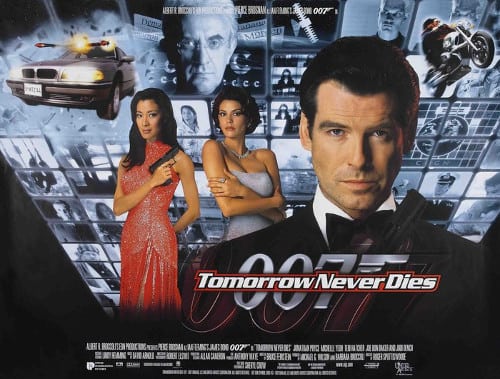
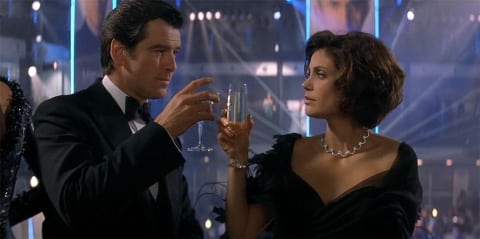
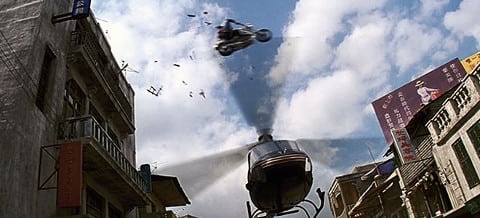

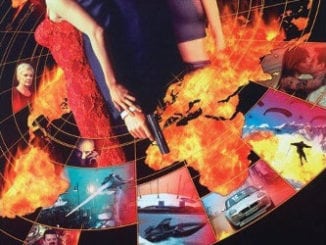

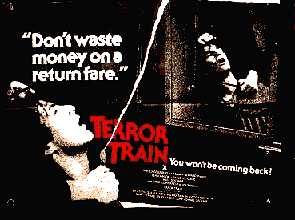
Be the first to comment